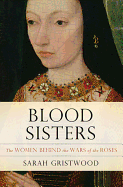
In Blood Sisters, historian Sarah Gristwood (Arbella: England's Lost Queen) tells the familiar story of the Wars of the Roses, the so-called "Cousins' War" between the houses of Lancaster and York over the throne of England, from a new perspective. Most histories of the period, Gristwood says, echo the "patriarchial assumptions" of the time by focusing on its male protagonists; she puts the kings and kingmakers in the back seat, bringing forward their mothers, wives, sisters and daughters.
Some of Gristwood's subjects, like heiress Anne Neville, were passed from one royal family to another like pieces of property. Others were actively involved in the politics of the time, using husbands and sons as their path to power. Whether pawns or players, all were caught up in the web of changing alliances, family loyalties and political machinations that defined the war. Gristwood pieces together their stories from household accounts, occasional letters and appearances in the accounts of others.
At its heart, Blood Sisters is about relationships. Gristwood describes the events surrounding the Wars of the Roses and the resultant rise of the Tudor dynasty as a family saga whose protagonists were tied together in many ways. By focusing on the lives of the Plantagenet women, she illustrates the complexities of those ties--and in the process, creates a larger picture of the Wars of the Roses. --Pamela Toler, blogging at History in the Margins

